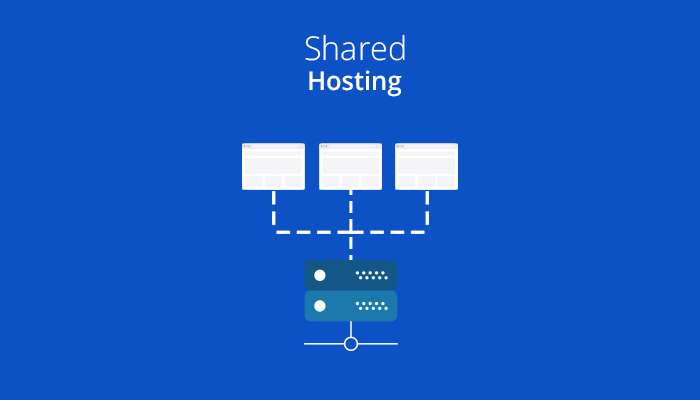There can be a lot of intimidation surrounding hosting. You’ll have a difficult time understanding what hosting is if you are not overly tech savvy, let alone knowing which types of hosting there are if you don’t have a clue what they are.
Having been around the block a couple of times and knowing all the tricks of the trade when it comes to website hosting, we at Website Builder Expert have been around the block a few times.
Furthermore, we have also conducted our own real-life research in order to help you choose the right hosting provider for your needs, as well as to help you choose what you need.
The type of hosting that you can choose from is wide and varied. However, we are going to focus on two of the most popular: shared hosting and virtual private servers (VPS) hosting.
What is Shared Hosting?

If you are unfamiliar with shared hosting, imagine it as a living arrangement where you have to share places such as a pool, a backyard, or a parking lot with other apartment residents.
As a result, when your site is hosted on a shared hosting server, you will share the same resources with other users who are also hosted on the same server, such as CPU, disk space, and memory.
Among all the hosting options available, shared hosting is the most affordable. There is a possibility that your website might have limited bandwidth and possibly get slow if there is a lot of traffic crowding websites on the same server as yours at the same time.
When there aren’t a lot of people in the pool, you can enjoy it when there aren’t a lot of people in it, but when everyone goes in, things can get a bit cramped – shared hosting is a lot like that.
Advantages of Shared Hosting
- More beginner-friendly hosting solution
- Provides a standardized setup
- Requires less technical expertise
- Least expensive of all hosting options
What is VPS?

Unlike shared hosting, VPS hosting still uses one physical server, and you’ll share it with other users, but each one of them will have its own set of resources, so you won’t be affected by other websites on the same server, as opposed to shared hosting where you’ll share it with other users.
With VPS hosting, each user has a dedicated virtual partition, so you can always be sure that there are always resources available to you, no matter what. The price of a VPS is obviously higher than that of a shared hosting account.
Using the analogy we used before, a VPS partition can be compared to owning an apartment in a building that has many units like yours – there are a lot of apartments like yours in the building, but you own everything you need and don’t have to share it with anyone else.
Advantages of VPS
- VPS hosting grants you root access to your server
- More memory and bandwidth, easily scalable
- It is not affected by other site’s traffic
- Much more stable and faster than shared hosting
Shared Hosting vs. VPS Hosting: A Comparison
Due to the fact that knowing the general definitions of shared and VPS hosting is not enough to help you decide whether or not you should move from shared hosting to VPS, we will provide you with some comparisons between the two hosting types.
Security and Performance
There is no doubt that security is a vital aspect of any website, regardless of the type. As for the security and stability of both types of hosting, there is some difference between them, yet they both serve the purpose of hosting your website.
As a shared hosting customer, you may be impacted by an error that occurs on another website when it comes to your site. As well as that, if other sites are using too much of the shared bandwidth, it could result in a slowdown on your website.
It is particularly important to do this if the number of visitors to your website is high. This problem can be avoided if you use a VPS server since the partitioned servers ensure that each of your websites will work according to its own requirements.
It is, however, necessary to consider your options if you lack the technical knowledge on how to take care of your virtual private server if you lack the technical knowledge.
Control
VPS hosting is the best option for you if you are looking for a more advanced option for your website than a shared hosting plan. In addition, it grants you root access to the server, allowing you to install your own OS, control panel, and software to enhance the performance and security of your site.
There are several hosting companies that offer simple setups, but Cyberpanel hosting is one that comes with a control panel that’s easy to use and comes ready to go out of the box.
Server Administration
You will need to perform little to no technical maintenance if you choose shared hosting. In addition to setting up the shared server, installing and upgrading cPanel or HCPanel, and monitoring the servers to avoid downtime, shared hosting providers also handle the backend of your website.
The management of resources is slightly more complicated with VPS hosting. The administration and management of this system require a bit more advanced knowledge. Thanks to VPS hosting, you can customize and configure software applications and increase the performance of your website. You also have root access, and you can tailor the back end of your website to suit your needs.
Final Word
There is a lot to consider when choosing a hosting plan for your website, especially what you expect from it. In comparison to shared hosting, VPS hosting provides you with many advantages that shared hosting does not provide.
Both hosting options, however, have their own advantages and disadvantages. It totally depends on which hosting you are more comfortable with.
